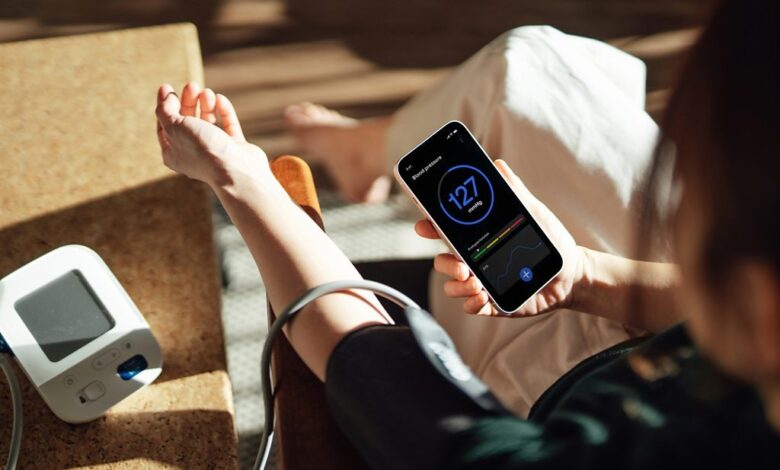How Technology is Changing the Way We Stay Healthy in 2025

In 2025, technology is no longer just about entertainment and convenience. It has become a core part of how we look after our health. From wearable gadgets to AI-powered health advice, new innovations are helping people in the UK monitor, improve, and even predict their wellbeing.
Let’s take a closer look at how modern tech is transforming the way we stay healthy, and why these changes are making life better for millions across the country.
How Technology is Revolutionising Health and Wellbeing in the UK?
From smartwatches on our wrists to AI-powered apps on our phones, technology is changing the way we take care of ourselves every day. It’s not just about counting steps anymore. Modern devices and digital tools give us personalised insights, easier access to healthcare, and new ways to stay active and healthy.
Let’s explore the key ways technology is reshaping health and wellbeing for people across the UK in 2025.
1. Wearable Devices: Your Health on Your Wrist
One of the biggest game changers in personal health has been wearable technology. In the UK, smartwatches and fitness trackers have gone from being “nice extras” to “must-have tools” for anyone serious about their wellbeing.
Modern smartwatches don’t just count steps anymore. They track heart rate, monitor sleep patterns, measure blood oxygen, and even warn you if your stress levels are too high. Some can perform an ECG test in under a minute — something that used to require a visit to the hospital.
If you’re considering getting one, you should check a detailed smartwatch buying guide in the UK to find the right model for your needs and budget.
2. AI-Powered Health Insights
Artificial intelligence (AI) is now built into many health apps and wearable devices. Instead of just showing you numbers, AI analyses your health data and gives personalised advice.
For example, if your smartwatch notices you haven’t been getting enough deep sleep, it might suggest changes to your evening routine. If your daily activity is low, it can give reminders to move, along with simple exercise tips.
UK-based fitness apps are even syncing with GP records in some cases, so your doctor can get a clearer view of your lifestyle and help you make better health decisions.
3. Telehealth and Remote Consultations
Booking a GP appointment in the UK can be tricky at times, but technology has made it easier through telehealth services. Instead of travelling to a clinic, you can now have a video consultation from your home, using your phone or laptop.
This is especially useful for people in rural areas, the elderly, or those with mobility issues. Many NHS services now allow patients to share health readings from their smartwatches or home monitoring devices directly with their doctor, making diagnosis quicker and more accurate.
4. Smart Home Health Devices
It’s not just wearables that are changing healthcare. Many people in the UK are now using smart home devices to stay healthy.
- Smart scales measure weight, body fat, and muscle mass, sending the data to your phone.
- Connected blood pressure monitors can track your readings over time and alert you if they go outside a safe range.
- Air quality monitors can warn you about pollution or allergens in your home, helping those with asthma or allergies.
These devices help people make informed decisions about their daily habits without needing constant hospital visits.
5. Fitness Apps and Online Classes
Technology has made fitness more accessible than ever. In 2025, UK residents can join live or recorded workout sessions from their living rooms. Whether it’s yoga, HIIT, cycling, or dance, there’s an app or online platform for every fitness style.
Subscription-based platforms like Peloton, Fiit, and Apple Fitness+ offer structured training programs and track your progress over time. Some even integrate with smartwatches so you can see your heart rate, calories burned, and improvement trends.
6. Nutrition Tracking Made Easy
Healthy eating is another area where tech is making a big difference. In the UK, many people are using apps to track meals, count calories, and make sure they’re getting the right nutrients.
Some apps can scan barcodes of supermarket items to instantly show nutritional values. Others connect with delivery services to recommend healthier meal options. When combined with smartwatch data, they can even adjust your meal plans based on your activity level.
7. Mental Health Support Through Technology
Mental health is just as important as physical health, and in 2025, technology offers new ways to take care of it.
Apps like Calm, Headspace, and NHS-backed mental wellbeing tools guide users through meditation, breathing exercises, and stress management techniques. Some UK-based services also offer instant chat support with trained counsellors.
Many smartwatches now include mindfulness reminders, prompting you to pause, breathe, and reset during stressful moments. This small feature can make a big difference in managing anxiety throughout the day.
8. Data Privacy and Security Concerns
While health technology offers many benefits, UK users are rightly concerned about how their personal data is stored and used. In 2025, stricter data protection laws mean companies must be more transparent about what they collect and why.
When choosing apps or devices, it’s worth checking:
- Where the data is stored (UK or overseas)
- Whether the company shares data with third parties
- How you can delete your information if you stop using the service
Trust is now a key factor in the growing health tech industry.
The Future of Health Technology in the UK
Looking ahead, the next wave of health technology in the UK could include:
- Non-invasive glucose monitoring for diabetics, built into everyday wearables.
- AI health coaches that provide tailored lifestyle plans.
- Integration with the NHS app for a complete view of your medical and lifestyle data.
- Smart clothing that tracks posture, movement, and even hydration levels.
These developments could make preventive healthcare more effective, saving both money and lives.
Conclusion
In 2025, technology is deeply woven into how people in the UK manage their health. From smartwatches and fitness trackers to AI-powered insights and telehealth, staying healthy is now more connected, convenient, and personalised than ever before.
By embracing these tools — and choosing them wisely — you can take better control of your wellbeing, whether you’re looking to improve fitness, monitor existing health conditions, or simply live a healthier lifestyle.




